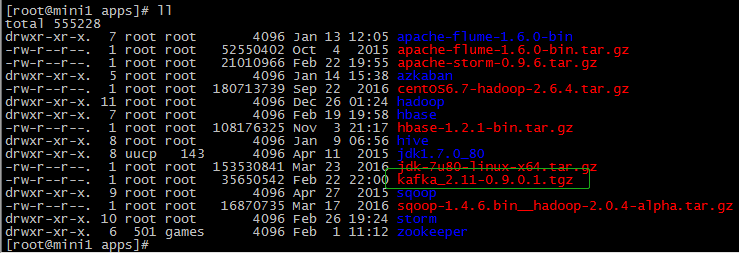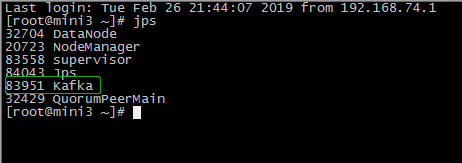大数据学习——Kafka集群部署
1下载安装包


2解压安装包
tar -zxvf kafka_2.-0.9.0.1.tgz mv kafka_2.-0.9.0.1 kafka
3修改配置文件
cp server.properties server.properties.bak
# Licensed to the Apache Software Foundation (ASF) under one or more
# contributor license agreements. See the NOTICE file distributed with
# this work for additional information regarding copyright ownership.
# The ASF licenses this file to You under the Apache License, Version 2.0
# (the "License"); you may not use this file except in compliance with
# the License. You may obtain a copy of the License at
#
# http://www.apache.org/licenses/LICENSE-2.0
#
# Unless required by applicable law or agreed to in writing, software
# distributed under the License is distributed on an "AS IS" BASIS,
# WITHOUT WARRANTIES OR CONDITIONS OF ANY KIND, either express or implied.
# See the License for the specific language governing permissions and
# limitations under the License.
# see kafka.server.KafkaConfig for additional details and defaults ############################# Server Basics ############################# # The id of the broker. This must be set to a unique integer for each broker.
broker.id= zookeeper.connect=mini1:,mini2:,mini3:
############################# Socket Server Settings ############################# #listeners=PLAINTEXT://:9092 # The port the socket server listens on
port= # Hostname the broker will bind to. If not set, the server will bind to all interfaces
host.name=mini1 # Hostname the broker will advertise to producers and consumers. If not set, it uses the
# value for "host.name" if configured. Otherwise, it will use the value returned from
# java.net.InetAddress.getCanonicalHostName().
advertised.host.name=192.168.74.100 # The port to publish to ZooKeeper for clients to use. If this is not set,
# it will publish the same port that the broker binds to.
advertised.port= # The number of threads handling network requests
num.network.threads= # The number of threads doing disk I/O
num.io.threads= # The send buffer (SO_SNDBUF) used by the socket server
socket.send.buffer.bytes= # The receive buffer (SO_RCVBUF) used by the socket server
socket.receive.buffer.bytes= # The maximum size of a request that the socket server will accept (protection against OOM)
socket.request.max.bytes= ############################# Log Basics ############################# # A comma seperated list of directories under which to store log files
log.dirs=/apps/logs/kafka # The default number of log partitions per topic. More partitions allow greater
# parallelism for consumption, but this will also result in more files across
# the brokers.
num.partitions= # The number of threads per data directory to be used for log recovery at startup and flushing at shutdown.
# This value is recommended to be increased for installations with data dirs located in RAID array.
num.recovery.threads.per.data.dir= ############################# Log Flush Policy ############################# # Messages are immediately written to the filesystem but by default we only fsync() to sync
# the OS cache lazily. The following configurations control the flush of data to disk.
# There are a few important trade-offs here:
# . Durability: Unflushed data may be lost if you are not using replication.
# . Latency: Very large flush intervals may lead to latency spikes when the flush does occur as there will be a lot of data to flush.
# . Throughput: The flush is generally the most expensive operation, and a small flush interval may lead to exceessive seeks.
# The settings below allow one to configure the flush policy to flush data after a period of time or
# every N messages (or both). This can be done globally and overridden on a per-topic basis. # The number of messages to accept before forcing a flush of data to disk
#log.flush.interval.messages= # The maximum amount of time a message can sit in a log before we force a flush
#log.flush.interval.ms= ############################# Log Retention Policy ############################# # The following configurations control the disposal of log segments. The policy can
# be set to delete segments after a period of time, or after a given size has accumulated.
# A segment will be deleted whenever *either* of these criteria are met. Deletion always happens
# from the end of the log. # The minimum age of a log file to be eligible for deletion
log.retention.hours= # A size-based retention policy for logs. Segments are pruned from the log as long as the remaining
# segments don't drop below log.retention.bytes.
#log.retention.bytes= # The maximum size of a log segment file. When this size is reached a new log segment will be created.
log.segment.bytes= # The interval at which log segments are checked to see if they can be deleted according
# to the retention policies
log.retention.check.interval.ms= ############################# Zookeeper ############################# # Zookeeper connection string (see zookeeper docs for details).
# This is a comma separated host:port pairs, each corresponding to a zk
# server. e.g. "127.0.0.1:3000,127.0.0.1:3001,127.0.0.1:3002".
# You can also append an optional chroot string to the urls to specify the
# root directory for all kafka znodes. # Timeout in ms for connecting to zookeeper
zookeeper.connection.timeout.ms=
/etc/profile
export KAFKA_HOME=/root/apps/kafka
export PATH=${KAFKA_HOME}/bin:$PATH
4分发安装包
scp -r $PWD mini2:$PWD
scp -r $PWD mini3:$PWD
修改 mini2上的配置文件
server.properties broker.id=1 host.name=mini2 advertised.host.name=192.168.74.101
修改 mini3上的配置文件
server.properties broker.id=2 host.name=mini3 advertised.host.name=192.168.74.103
5启动集群
在/root/apps/kafka/bin目录下
./kafka-server-start.sh /root/apps/kafka/config/server.properties
6查看集群



------------------------------------------------------------------------------------------------------------------------------------------------------------------------------------------------------------------------------------------------------------------------------------
------------------------------------------------------------------------------------------------------------------------------------------------------------------------------------------------------------------------------------------------------------------------------------
在mini1的/root/apps/kafka目录下
1 创建topic
bin/kafka-topics.sh --create --zookeeper mini1: --replication-factor --partitions --topic test0225
2 生产者生产数据
bin/kafka-console-producer.sh --broker-list mini1: --topic test0225
在mini3的/root/apps/kafka目录下
3消费者消费
bin/kafka-console-consumer.sh --zookeeper mini1: --from-beginning --topic test0225


大数据学习——Kafka集群部署的更多相关文章
- 大数据学习——HADOOP集群搭建
4.1 HADOOP集群搭建 4.1.1集群简介 HADOOP集群具体来说包含两个集群:HDFS集群和YARN集群,两者逻辑上分离,但物理上常在一起 HDFS集群: 负责海量数据的存储,集群中的角色主 ...
- 大数据学习——Storm集群搭建
安装storm之前要安装zookeeper 一.安装storm步骤 1.下载安装包 2.解压安装包 .tar.gz storm 3.修改配置文件 mv /root/apps/storm/conf/st ...
- 大数据学习——hdfs集群启动
第一种方式: 1 格式化namecode(是对namecode进行格式化) hdfs namenode -format(或者是hadoop namenode -format) 进入 cd /root/ ...
- 大数据学习——hadoop集群搭建2.X
1.准备Linux环境 1.0先将虚拟机的网络模式选为NAT 1.1修改主机名 vi /etc/sysconfig/network NETWORKING=yes HOSTNAME=itcast ### ...
- 大数据学习——下载集群根目录下的文件到E盘
代码如下: package cn.itcast.hdfs; import java.io.IOException; import org.apache.hadoop.conf.Configuratio ...
- 大数据学习——yarn集群启动
启动yarn命令: start-yarn.sh 验证是否启动成功 jps查看进程 http://192.168.74.100:8088页面 关闭 stop-yarn.sh
- Kafka集群部署以及使用
Kafka集群部署 部署步骤 hadoop102 hadoop103 hadoop104 zk zk zk kafka kafka kafka http://kafka.apache.org/down ...
- zookeeper集群+kafka集群 部署
zookeeper集群 +kafka 集群部署 1.Zookeeper 概述: Zookeeper 定义 zookeeper是一个开源的分布式的,为分布式框架提供协调服务的Apache项目 Zooke ...
- 朝花夕拾之--大数据平台CDH集群离线搭建
body { border: 1px solid #ddd; outline: 1300px solid #fff; margin: 16px auto; } body .markdown-body ...
随机推荐
- C#泛型学习笔记
泛型默认值default 如果T是int默认是0 str默认是null public class MyTest<T>{ public T GetValue() { T t = defau ...
- 学习express(一)
菜鸟教程简介:Express 是一个简洁而灵活的 node.js Web应用框架, 提供了一系列强大特性帮助你创建各种 Web 应用,和丰富的 HTTP 工具. 使用 Express 可以快速地搭建一 ...
- JS小游戏
捕鱼达人 飞机大战游戏 详解javaScript的深拷贝 http://www.cnblogs.com/penghuwan/p/7359026.html
- [Q&A]VS 2012 MVC4专案与网站的差异?「ASP.NET组态」的Login账号出现在「新旧两组」会员数据库里面?
原文出處 http://www.dotblogs.com.tw/mis2000lab/archive/2013/08/30/mvc4_vs2012_login_member_db.aspx [Q&a ...
- glob - 形成路径名称
描述 (DESCRIPTION) 很久以前 在 UNIX V6 版 中 有一个 程序 /etc/glob 用来 展开 通配符模板. 不久以后 它 成为 shell 内建功能. 现在 人们 开发了 类似 ...
- CAD交互绘制圆形云线批注(网页版)
js中实现代码说明: 动态拖放时的绘制事件: function DoDynWorldDrawFun(dX,dY,pWorldDraw,pData) { //自定义实体的GUID标识符 var sGui ...
- WINDOWS-API:取得当前用户账户名-GetUserName
bool TFormMain::GetCurrentProcessUser(AnsiString& strUserName) { bool bRet = false; //strUserNam ...
- tomcat中如何禁止和允许主机或地址访问
1.tomcat中如何禁止和允许列目录下的文件 在{tomcat_home}/conf/web.xml中,把listings参数设置成false即可,如下: <servlet>...< ...
- java在线聊天项目0.2版本 制作客户端窗体,使用swing(用户界面开发工具包)和awt(抽象窗口工具包) BorderLayout布局与GridLayout布局不同之处 JPanel设置大小
代码如下: package com.swift; import java.awt.BorderLayout; import java.awt.Color; import javax.swing.JBu ...
- ios retain copy assign相关
assign: 简单赋值,不更改索引计数copy: 建立一个索引计数为1的对象,然后释放旧对象retain:释放旧的对象,将旧对象的值赋予输入对象,再提高输入对象的索引计数为1 Copy其实是建立了一 ...
